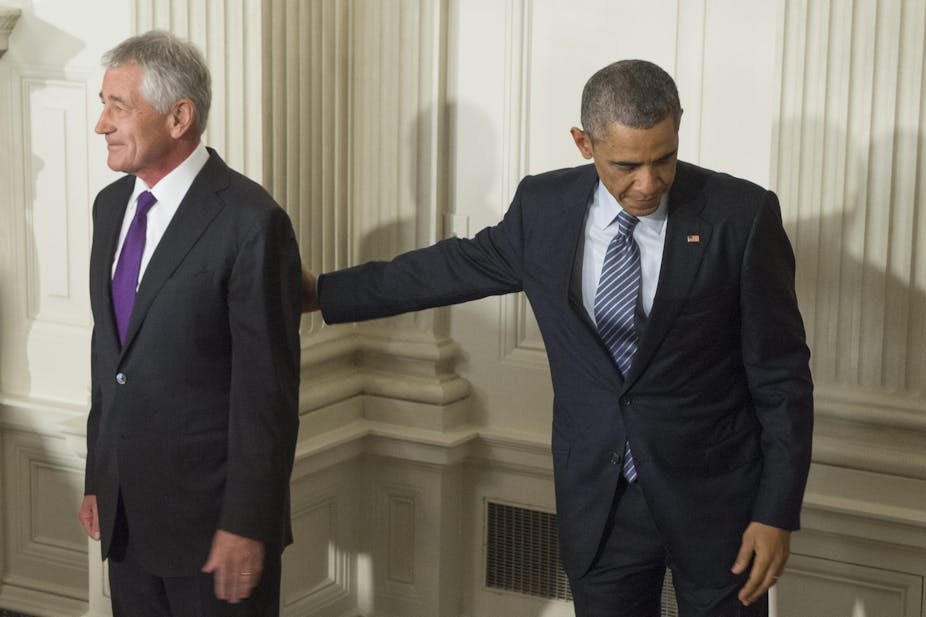To lose one Secretary of Defense might be considered unfortunate. To have lost three and to be looking for a fourth looks like something more fundamental and systemic. The early departure of Chuck Hagel has been used by the Obama administration’s growing band of critics to claim that there is something about the way the White House does business that creates the need for sacrificial lambs – if that’s quite the way to describe someone who saw active service in Vietnam.
Hagel’s critics – of whom there is suddenly no shortage – argue that he has struggled to define a coherent grand strategy and was unable to win all-important internal policy debates within White House. Falling out with powerful Obama favorites like national security advisor Susan Rice over American policy toward Syria plainly didn’t help Hagel’s cause either. But it’s worth considering what success actually looks in a job that has become increasingly complex and political.
It’s important to remember that whatever personal qualities Hagel may or may not have had, the principal tasks he was given were essentially unachievable and irreconcilable. On the one hand, Hagel was charged with reducing American defence spending while simultaneously ensuring that its military was capable of addressing a range of threats that seemed to show few signs of diminishing – unlike the funding available to underwrite America’s hegemonic ambitions.
On the other hand, the nature of contemporary security challenges made the development of an effective response increasingly difficult. Even in comparatively straitened times, the US still has by far the most powerful military capability in the world – for all the good it does the American people. The paradoxical reality is that the US is unable to deploy its overwhelming military might decisively against enemies whose principal weapons are ideological.
Even traditional potential foes like North Korea or Russia remain largely undeterred by American military might. Effective economic sanctions are another thing altogether, but these are not generally the first weapons of choice for defence secretaries anywhere, more’s the pity.
The poisonous domestic politics that have all but paralysed the Obama administration at times are undoubtedly making it evermore difficult for the US to present an image of itself as an effective and decisive foreign policy actor. That this may have more to do with the nature of asymmetric warfare and non-traditional security threats that defy easy resolution is a possibility that gets scant attention in America’s increasingly toxic and polarised domestic politics.
The pressure on the Obama administration to “do something” and act decisively in policy terms has been reinforced by the Democrats’ drubbing in the midterm elections. All of this only serves to reinforce the impression that American security and foreign policy is driven primarily by domestic political considerations rather than any immediate existential threat to American citizens, much less the American state.
There is, perhaps, nothing surprising in this observation, but some of its implications are not always readily appreciated. Even those of us who are broadly in sympathy with Barack Obama’s much-derided speech on climate change at the G20 would have to concede that this was largely driven by America’s domestic political realities. A preoccupation with his “legacy” undoubtedly looms larger by the day in Obama’s thinking, and this has direct consequences for the final stages of his administration and its impact on the wider world.
Again, there is nothing surprising about any of this. What matters is the impact of America’s political priorities are likely to have on foe and friend alike as they are caught in the policy backwash. For staunch and generally uncritical supporters of American policy like Australia, this has come as an unwelcome and unsettling surprise. It shouldn’t have done: powerful countries tend to do what they will for contingent national reasons. The influence and sensitivities of even the most useful of allies are of secondary importance.
The lasting significance of recent changes in America’s national security establishment, therefore, at least as far as Australia is concerned, is firstly, that major changes in policy orientation and strategic goals are likely to be determined with little consultation with key allies.
Secondly, and most importantly, perhaps, it really does make a difference who is in charge. Some people may be judged more effective than others at actually implementing policy, but the priorities and purposes to which America’s – or anybody else’s, for that matter – immense power is put is determined by the make up of particular administrations.
We may get to see what a more “decisive” approach to foreign and strategic policy looks like in two years time when a new president is inaugurated. For all its problems, we may yet look back on the Obama administration with nostalgic admiration. There are worse faults in strategic policy than excess caution. We may also come to reassess Hagel’s contribution and approach as a consequence, too.

